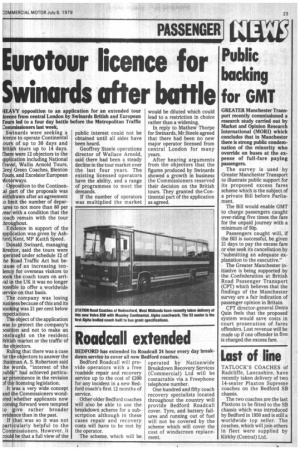Eurotour licence for Swinards after battle
Page 25

If you've noticed an error in this article please click here to report it so we can fix it.
FIEAVY opposition to an application for an extended tour icence from central London by Swinards British and European fours led to a four day battle before the Metropolitan Traffic Commissioners last week.
Swinards were seeking a icerce to operate Continental ours of up to 30 days and 3ritish tours up to 14 days. ['here were 12 objectors to the ippl cation including National ['ravel, Wallis Arnold Tours, 'key Green Coaches, Blenton Pours, and Excelsior European Vlotorways.
Opposition to the Continenal part of the proposals was withdrawn after an agreement :o limit the number of depar:ures to not more than 80 per mar with a condition that the .:oach remain with the tour ,hroughout.
Evidence in support of the appt cation was given by Ashrord Kent, MP Keith Speed.
Donald Swinard, managing Erector, said the tours were )perated under schedule 12 of he Road Traffic Act but be.tause of an increasing teniency for overseas visitors to Pook the coach tours on arrifal in the UK it was no longer Possible to offer a worldwide ;ervice on that basis.
The company was losing Pusiness because of this and its pocking was 21 per cent below ?apectations.
The object of the application was to protect the company's position and not to make an pnslaught on the resident British market or the traffic of :he objectors.
Ruling that there was a case for the objectors to answer the %airman A. S. Robertson said the words, "interest of the public" had achieved particuar prominence in the revision A the licensing legislation.
It was a very wide concept and IM Commissioners wond?.red whether applicants now oming forward were tempted to give rather broader Rvidence than in the past.
If that was so it was not part cularly helpful to the Commissioners, However, it could be that a full view of the public interest could not be obtained until all sides have been heard.
Geoffrey Steele operations director of Wallace Arnold, said there had been a steady decline in the tour market over the last four years. The existing licensed operators have the ability, and a range of programmes to meet the demands.
If the number of operators was multiplied the market would be diluted which could lead to a restriction in choice rather than a widening.
In reply to Mathew Thorpe for Swinards, Mr Steele agreed that there had been no new major operator licensed from central London for many years.
After hearing arguments from the objectors that the figures produced by Swinards showed a growth in business the Commissioners reserved their decision on the British tours. They granted the Continental part of the application as agreed.




























































































































